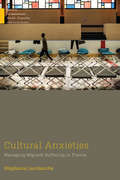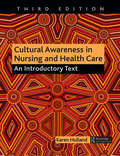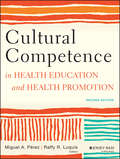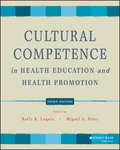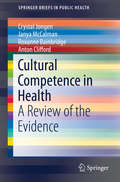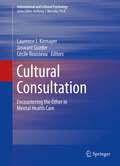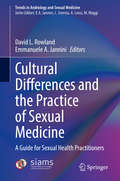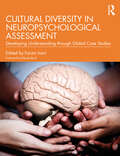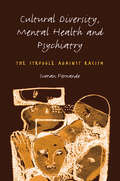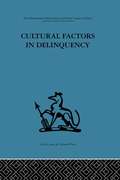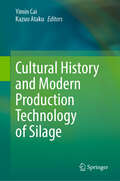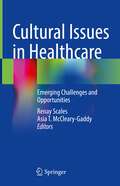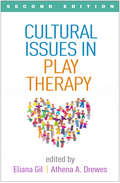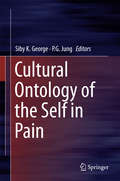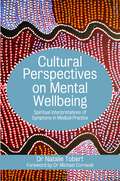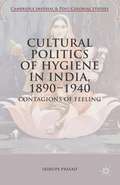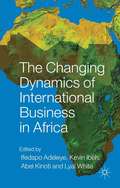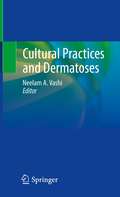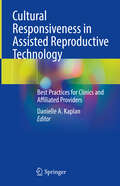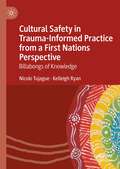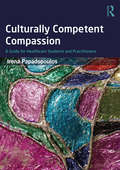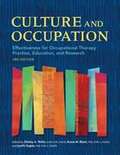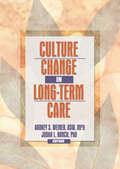- Table View
- List View
Cultural Anxieties: Managing Migrant Suffering in France (Medical Anthropology)
by Stéphanie LarchanchéCultural Anxieties is a gripping ethnography about Centre Minkowska, a transcultural psychiatry clinic in Paris, France. From her unique position as both observer and staff member, anthropologist Stéphanie Larchanché explores the challenges of providing non-stigmatizing mental healthcare to migrants. In particular, she documents how restrictive immigration policies, limited resources, and social anxieties about the “other” combine to constrain the work of state social and health service providers who refer migrants to the clinic and who tend to frame "migrant suffering" as a problem of integration that requires cultural expertise to address. In this context, Larchanché describes how staff members at Minkowska struggle to promote cultural competence, which offers a culturally and linguistically sensitive approach to care while simultaneously addressing the broader structural factors that impact migrants’ mental health. Ultimately, Larchanché identifies practical routes for improving caregiving practices and promoting hospitality—including professional training, action research, and advocacy.
Cultural Awareness in Nursing and Health Care: An Introductory Text
by Karen HollandThis introductory textbook relates theory to practice and enhances students' learning and understanding of cultural issues that impact on patient care and their own practice as nurses, while considering wider social and political issues. Now in its third edition, Cultural Awareness in Nursing and Health Care has been updated to include new research, evidence and a completely new chapter focusing on the health care workforce itself and the issues it’s facing. Other topics include: Health, illness and religious beliefs; Mental health and culture; Women’s and men’s health in a multicultural society; Caring for the elderly; Death and bereavement. Key features: Includes international perspectives and issues relating to overseas nurses studying and working in the UK; Case studies, reflective exercises, summary boxes and website links designed to stimulate discussion and shared practice; Fully updated with guidelines for practice and education.
Cultural Competence in Health Education and Health Promotion
by Raffy R. Luquis Miguel A. PérezCultural Competence in Health Education and Health Promotion examines the importance of ethnic and cultural factors for community health practice. The first in a new series of book to be published by Jossey-Bass and the American Association for Health Education, this text describes essential theories, models, and practices for working with race, ethnicity, gender, and social issues. The volume editors and their contributors, all experts in this field, cover demographics, disparities, complementary and alternative medicine, spiritually grounded approaches, multicultural populations, culturally competent needs assessment and planning, communication, workforce, program planning, aging, sexual orientation, and future challenges. Useful for both undergraduate and graduate students in the field of health education and health promotion, school health, public health, preventive medicine, nursing, and allied health fields, the publication is essential reading for those learning or practicing health education and health promotion.
Cultural Competence in Health Education and Health Promotion (Public Health/AAHE #18)
by Raffy R. Luquis Miguel A. PérezLearn to manage cultural and ethnic diversity and deliver health education results with this leading resource Cultural Competence in Health Education and Health Promotion, 3rd Edition extensively covers a host of crucial topics on the subject of health education and promotion to various cultural and ethnic groups. The authors provide concrete strategies and practical advice for those seeking to maximize the health-related results they achieve from their education efforts. The significant updates in this newest edition of Cultural Competence in Health Education and Health Promotion include: Updated and expanded demographic information on select groups based on the most up-to-date census data The use of universal design for diverse populations Examples of programs to increase health literacy among diverse groups Including updated case scenarios and new, innovative health programs, the 3rd edition of Cultural Competence in Health Education and Health Promotion represents an unprecedented leap forward for this already celebrated series. It’s perfect for any health educator who deals with an ethnically or culturally diverse population.
Cultural Competence in Health: A Review of the Evidence (SpringerBriefs in Public Health)
by Janya Mccalman Crystal Jongen Roxanne Bainbridge Anton CliffordThis resource supports evidence-informed approaches to improving the cultural competence of health service delivery. By reviewing the evidence from Australia, Canada, New Zealand and the US, it provides readers with a clear and systematic overview of the interventions and indicators applied to enable health system agencies and professionals to work effectively in various cross-cultural health care situations. The book highlights the importance of cultural competence and describes the current situation in the studied countries; identifies effective approaches and strategies for improving the situation; reviews the indicators for measuring progress; assesses the health outcomes associated with cultural competence; summarizes the quality of the evidence; and presents an evidence-informed conceptual framework for cultural competence in health. Cultural competence is critical to reducing health disparities and has become a popular concept in these countries for improving access to high-quality, respectful and responsive health care. This book provides policy makers, health practitioners, researchers and students with a much needed summary of what works to improve health systems, services and practice.
Cultural Consultation: Encountering the Other in Mental Health Care (International and Cultural Psychology)
by Laurence J. Kirmayer Jaswant Guzder Cécile RousseauBased on a recently completed project of cultural consultation in Montreal, Cultural Consultation presents a model of multicultural and applicable health care. This model used clinicians and consultants to provide in-depth assessment, treatment planning, and limited interventions in consultation with frontline primary care and mental health practitioners working with immigrants, refugees, and members of indigenous and ethnocultural communities. Evaluation of the service has demonstrated that focused interventions by consultants familiar with patients' cultural backgrounds could improve the relationship between the patient and the primary clinician. This volume presents models for intercultural work in psychiatry and psychology in primary care, general hospital and specialty mental health settings. The editors highlight crucial topics such as: - Discussing the social context of intercultural mental health care, conceptual models of the role of culture in psychopathology and healing, and the development of a cultural consultation service and a specialized cultural psychiatric service - Examining the process of intercultural work more closely with particular emphasis oto strategies of consultation, the identity of the clinician, the ways in which gender and culture position the clinician, and and interaction of the consultant with family systems and larger institutions - Highlighting special situations that may place specific demands on the clinician: working with refugees and survivors of torture or political violence, with separated families, and with patients with psychotic episodes This book is of valuable use to mental health practitioners who are working in multidisciplinary settings who seek to understand cultural difference in complex cases. Psychiatrists, psychologists, social workers, nurse practitioners, primary care providers and trainees in these disciplines will make thorough use of the material covered in this text.
Cultural Differences and the Practice of Sexual Medicine: A Guide for Sexual Health Practitioners (Trends in Andrology and Sexual Medicine)
by Emmanuele A. Jannini David L. RowlandThe aim of this book is twofold: to promote an awareness of cultural differences in connection with sexual medicine among health care providers, and to demonstrate how such differences are relevant to the care and treatment of patients with sexual issues. Individual sexuality represents the cumulative effects of biological, psychological, and cultural influences. Yet much of the study of sexuality—including issues ranging from sexual identity to sexual response—has been conducted through a Western lens. Although a substantial body of work in anthropology has taken up the study of human sexuality from a cross-cultural perspective, two points are notable. First, this work seldom crosses the desks of medical and psychological health practitioners, and second, the relevance of specific cultural differences is rarely apparent to the typical sexual health practitioner. To address this situation, this book adopts a global perspective, focusing on how cultural practices and values can impact health care, treatment, and outcomes. In this regard, it covers three broad domains: Sexual Identity and Orientation; Sexual Response and Dysfunction; and Sexual Diversity. Each chapter consists of two parts: a general description of the relevant issues, and a discussion of how these issues can be relevant to clinical practice. The book offers a valuable, practical tool for specialists in sexual medicine and sexual psychology, for sexual healthcare givers, and for sexological researchers who want to better serve their patients by developing an awareness of and sensitivity to cultural differences, and by providing a framework for dealing with issues of sexuality and sexual health that takes cultural values into consideration, while adhering to best practices in patient care.
Cultural Diversity in Neuropsychological Assessment: Developing Understanding through Global Case Studies
by Farzin IraniCultural Diversity in Neuropsychological Assessment provides a platform for clinical neuropsychologists, psychologists, and trainees to bridge cultures and speak to each other about the ethnically diverse communities they serve throughout the world. It allows readers to peek into their clinical filing cabinets and examine how they worked with diverse individuals from indigenous and migrant communities of Arab, Asian, European, Israeli, Latin American and Caribbean, Persian, Russian, Sub-Saharan African, and North American origin. The book first reviews important foundations for working with diverse communities that include key knowledge, awareness, skills, and action orientation. It then provides a collection of cases for each cultural geographic region. Each section begins with an introductory chapter to provide a bird’s eye view of the historical and current state of clinical and research practice of neuropsychology in that region. Then, each chapter focuses on a specific community by providing surface and deep-level cultural background knowledge from the authors’ unique perspectives. A case study is then covered in depth to practically showcase an evaluation with someone from that community. This is followed by a summary of key strategic points, lessons learned, references, further readings, and a glossary of culture specific terminology used throughout the chapter. In the end, the appendix provides a list of culturally relevant tests and norms for some communities. This ground-breaking peer-reviewed handbook provides an invaluable clinical resource for neuropsychologists, psychologists, and trainees. It increases self-reflection about multicultural awareness and knowledge, highlights practical ways to increase cultural understanding in neuropsychological and psychological assessments, and sparks further discussion for professional and personal growth in this area.
Cultural Diversity, Mental Health and Psychiatry: The Struggle Against Racism
by Suman Fernando Dr Suman Fernando'Black and minority ethnic communities lack confidence in mental health services', according to the National Service Framework for Mental Health published by the Department of Health in 1999. Cultural Diversity, Mental Health and Psychiatry examines how and why this situation has come about, and makes specific practical, often surprising, suggestions for changing the status quo. In his latest and most critical analysis, Suman Fernando reflects on the current situation in light of his own personal experience, academic research and anecdotal reports. He weaves together themes of immense importance for the future of psychiatry and mental health services in a multi-cultural setting, exploring:* the nature of racism and its permeation into mental health services * the inside story of the struggle against racism in statutory and voluntary sectors of the mental health system* the history of psychiatry and the role of spirituality, holistic thinking, psychotherapy and Asian traditions of medicine. Trainees, practitioners, and managers of mental health services will profit from the practical application of Fernando's latest ideas, and students and academics will benefit from his theoretical guidance.
Cultural Factors in Delinquency
by T. C. N. Gibbens R. H. AhrenfeldtTavistock Press was established as a co-operative venture between the Tavistock Institute and Routledge & Kegan Paul (RKP) in the 1950s to produce a series of major contributions across the social sciences. This volume is part of a 2001 reissue of a selection of those important works which have since gone out of print, or are difficult to locate. Published by Routledge, 112 volumes in total are being brought together under the name The International Behavioural and Social Sciences Library: Classics from the Tavistock Press. Reproduced here in facsimile, this volume was originally published in 1966 and is available individually. The collection is also available in a number of themed mini-sets of between 5 and 13 volumes, or as a complete collection.
Cultural History and Modern Production Technology of Silage
by Yimin Cai Kazuo AtakuThis book offers a comprehensive overview of silage history, culture, and production technology. It systematically collects novel research ideas and application cases, including the integration of smart agriculture in silage preparation, reduction of greenhouse gas emissions, and sustainable livestock production. The chapters delve into key topics such as the principles of silage fermentation, modern production technologies, and the utilization of agricultural by-products. Readers will encounter expert analyses on strategies for reducing greenhouse gas emissions and achieving carbon neutrality in animal husbandry. The book also explores the application of smart agricultural technologies, which enhance production efficiency and reduce environmental impact. Contributions from eminent scholars provide diverse perspectives on these pressing issues, making this volume a critical resource for understanding the future of silage and livestock production. This book is an invaluable resource for university researchers, R&D engineers, agricultural administrators, and graduate students interested in silage fermentation and production technology. It serves as a reference textbook for animal husbandry majors and professionals in related fields, offering insights into the latest advancements and practical applications. This book is essential for those seeking to innovate within the evolving landscape of sustainable agriculture. It provides the knowledge and tools necessary to contribute to the development of sustainable livestock production and smart agricultural practices.
Cultural Issues in Healthcare: Emerging Challenges and Opportunities
by Renay Scales Asia T. McCleary-GaddyThis easy-to-read book is designed to prepare medical, biomedical and other health professionals in training to provide healthcare services to patients by utilizing the scholarship in the published chapters to better understand the evolving symbiotic relationship between attention to the needs of patient communities and achieving effective access, treatment, and quality of care. While studies have been done on health inequity and disparities, moving to solution-based strategies not only requires more knowledge but a pathway to praxis. The editors and chapter authors of this unique title are established practitioners in the areas they write about and provide refreshing ways to advance our work in healthcare.The market for this title is all medical, dental, nursing, physician assistant and other academic programs; they can use this book for active learning in classes as a supplemental text. Since this material can also be used as a reference for board exam questions of various healthcare disciplines, the organizations below are good contacts for marketing. National Board of Osteopathic Medical Examiners Association for American Medical Colleges National Medical Association American Medical Association Association for Medical Ethics The American Association of Colleges of Nursing American Dental Education Service American Public Health Association National Association of Medical Minority Educators American Sociological Association American College of Healthcare Executives
Cultural Issues in Play Therapy, Second Edition
by Eliana Gil Athena A. DrewesThis unique resource is now in an extensively revised second edition with more than 90% new material and an expanded conceptual framework. Filled with rich case illustrations, the book explores how children's cultural identities--as well as experiences of marginalization--shape the challenges they bring to therapy and the ways they express themselves. Expert practitioners guide therapists to build competence for working across different dimensions of diversity, including race and ethnicity, gender identity, sexual orientation, and disability. Purchasers get access to a companion website featuring chapters from the first edition on play therapy with major cultural groups: African Americans, Hispanics, Native Americans, and Asian Americans. New to This Edition *Virtually a new book; incorporates a broader definition of culture and an increased social justice focus. *Chapters on working with children of color, LGBT children and adolescents, undocumented families, and Deaf children. *Chapter on dismantling white privilege in the play therapy office. *Chapters on school bullying and on how technology is transforming play, including tips for conducting tele-play therapy.
Cultural Ontology of the Self in Pain
by Siby K. George P. G. JungThe mainstream approach to the understanding of pain continues to be governed by the biomedical paradigm and the dualistic Cartesian ontology. This Volume brings together essays of scholars of literature, philosophy and history on the many enigmatic shades of pain-experience, mostly from an anti-Cartesian perspective of cultural ontology by scholars of literature, philosophy and history. A section of the essays is devoted to the socio-political dimensions of pain in the Indian context. The book offers a critical perspective on the reductive conceptions of pain and argue that non-substance ontology or cultural ontology supports a more humane and authentic understanding of pain. The general ontological features of the self in pain and culturally imbued dimensions of pain-experience are, thus, brought together in a rare blend in this Volume. The essays dwell on the importance of understanding what cultural, social and political forces outside our control do to our pain-experience. They show why such understanding is necessary, both to humanely deal with pain, and to rectify erroneous approaches to pain-experience. They also explore the thoroughly ambivalent spaces between pain and pleasure, and the cathartic and productive dimensions of pain. The essays in this Volume investigate pain-experiences through the fresh lenses of history, gender, ethics, politics, death, illness, self-loss, torture, shame, dispossession and denial.
Cultural Perspectives on Mental Wellbeing: Spiritual Interpretations of Symptoms in Medical Practice
by Natalie Tobert Michael CornwallAs human migration brings an ever more diverse range of people, cultures and beliefs into contact, Western medical systems must adapt to cater for the different approaches it encounters towards illness, the body, gender, mental health and death. Based upon training courses taught by the author to staff at hospitals, mental health professionals, and on degree courses, this complete resource provides an essential foundation for understanding the complex and manifold approaches to medicine and health around the world. An awareness of this diversity moreover allows healthcare professionals to better engage with their patients and offer them satisfactory care and support in the future.
Cultural Politics of Hygiene in India, 1890-1940: Contagions of Feeling (Cambridge Imperial and Post-Colonial Studies Series)
by Srirupa PrasadThis book examines genealogies of contagion in between contagion as microbe and contagion as affect. It analyzes how and why hygiene became authoritative and succeeded in becoming a part of the broader social and cultural vocabulary within the colonialist, anti-colonial, as well as modernist discourses.
Cultural Politics of Hygiene in India, 1890�1940: Contagions Of Feeling (Cambridge Imperial and Post-Colonial Studies Series)
by Srirupa PrasadThis book examines genealogies of contagion in between contagion as microbe and contagion as affect. It analyzes how and why hygiene became authoritative and succeeded in becoming a part of the broader social and cultural vocabulary within the colonialist, anti-colonial, as well as modernist discourses.
Cultural Practices and Dermatoses
by Neelam A. VashiThis book addresses the importance of the physicians’ understanding on how varying ethnic and cultural identities can affect dermatological disease presentation in patients. It bridges the gap in knowledge for practicing dermatologists, especially those not studying or practicing in a highly multi-ethnic center who may not be exposed to patients from a variety of cultures. Concise and cohesive, the book examines how dermatoses can manifest due to cosmetic practices, therapeutics, religious practices, cultural hair-related practices, and environmental variables. These elements underscore that without exposure to patients of varying backgrounds, it can be nearly impossible to learn about practices that may influence a patient's health. There are many examples of cultural practices causing dermatologic lesions, and it is becoming increasingly more likely that practicing dermatologists will encounter patients with these findings as migration, tourism, and public interest continue to rise. Socially conscientious and relevant, Cultural Practices and Dermatoses covers everything from more common cultural practices, such as acupuncture and threading, to lesser known ones, like pew blisters and turban ear, as there is limited medical literature describing their cutaneous effects and complications.
Cultural Responsiveness in Assisted Reproductive Technology: Best Practices for Clinics and Affiliated Providers
by Danielle A. KaplanCultural Responsiveness in Assisted Reproductive Technology discusses best practices for creating an ART practice that is welcoming to and responsive to the unique needs of patients from a variety of racial, ethnic, and religious backgrounds. Rather than focusing solely on outcomes for patients who are already undergoing treatment, the emphasis here is on creating a practice environment in which patients from diverse backgrounds are welcomed, understood, and treated according to their unique cultural needs. This volume contains 18 chapters divided into 4 parts. Part 1 seeks to understand potential issues related to race, ethnicity, culture, implicit bias, and access to care. Part 2 discusses medical considerations in ART within diverse populations, while Part 3 covers cultural considerations in ART in diverse populations. Finally, Part 4 proposes interventions to address the issues discussed throughout the book as well as strategies for culturally responsive practice management. This book was written by reproductive endocrinologists, nurses, clinician educators, and mental health professionals specializing in infertility counselling and is intended to provide updated information on ART outcomes among members of different racial and ethnic groups, as well as discuss factors that influence the experiences of patients from diverse populations in ART treatment.
Cultural Safety in Aotearoa New Zealand
by Dianne WepaIn this second edition of Cultural Safety in Aotearoa New Zealand, editor Dianne Wepa presents a range of theoretical and practice-based perspectives adopted by experienced educators who are active in cultural safety education. Thoroughly revised to incorporate the latest methods and research, this edition reflects updates in government policies and nursing practices, and features new chapters on ethical considerations when working cross-culturally, as well as the legislative requirements of the Nursing Council of New Zealand. Each chapter includes key terms and concepts, practice examples providing content from healthcare workers' everyday experiences, reflective questions to encourage the assimilation of ideas into practice, and references to allow further exploration of the issues discussed. Cultural Safety in Aotearoa New Zealand will equip students, tutors, managers, policy analysts and others involved in the delivery of healthcare with the tools to acknowledge the importance of cultural difference in achieving health and well-being in diverse communities.
Cultural Safety in Trauma-Informed Practice from a First Nations Perspective: Billabongs of Knowledge
by Nicole Tujague Kelleigh RyanThis book provides an accessible resource for conducting culturally safe and trauma-informed practice with First Nations’ peoples in Australia. Designed by and for Australian Indigenous peoples, it explores psychological trauma and healing, and the clinical and cultural implications of the impacts of colonization, through an Indigenous lens. It is a companion for anyone who works or will work with our families and communities. The authors recognise trauma at the heart of all Indigenous disadvantage, and explore types of trauma in the context of Indigenous, collective cultures. The chapters take an Indigenous ‘Yarning’ approach to sharing knowledge, and encourage readers to challenge their unconscious, long-held beliefs and worldviews. Nicole Tujague and Kelleigh Ryan identify the differences between mainstream systems and more holistic Indigenous understandings of social and emotional health and wellbeing and outline a meaningful practice framework for practitioners. They analyse types of complex trauma, including intergenerational, institutional, collective and historical trauma; and discuss the impacts of racism and the concept of ‘cultural load’. They also address vicarious, or “compassion” trauma experienced by front line workers and carers; and offer insights into their experience of working with collective healing programs.This book is essential reading for Indigenous practitioners and service providers to Aboriginal and Torres Strait Islander people. It is also a valuable resource for students likely to work with First Nations’ peoples within a broad range of health and social science disciplines.
Culturally Competent Compassion: A Guide for Healthcare Students and Practitioners
by Irena PapadopoulosBringing together the crucially important topics of cultural competence and compassion for the first time, this book explores how to practise ‘culturally competent compassion’ in healthcare settings – that is, understanding the suffering of others and wanting to do something about it using culturally appropriate and acceptable caring interventions. This text first discusses the philosophical and religious roots of compassion before investigating notions of health, illness, culture and multicultural societies. Drawing this information together, it then introduces two invaluable frameworks for practice, one of cultural competence and one of culturally competent compassion, and applies them to care scenarios. Papadopoulos goes on to discuss: how nurses in different countries understand and provide compassion in practice; how students learn about compassion; how leaders can create and champion compassionate working environments; and how we can, and whether we should, measure compassion. Culturally Competent Compassion is essential reading for healthcare students and its combination of theoretical content and practice application provides a relevant and interesting learning experience. The innovative model for practice presented here will also be of interest to researchers exploring cultural competence and compassion in healthcare.
Culture And Occupation: Effectiveness For Occupational Therapy Practice, Education, And Research
by Roxie M. Black Shirley A. Wells Jyothi GuptaOccupational therapy can no longer ignore the larger contextual issues that bring a diverse array of clients for services. Practitioners, educators, researchers, and students across all practice areas must recognize the need to be social agents for change and to educate about sociopolitical structures that maintain inequities and disparities in health and occupation. Only by becoming culturally competent can occupational therapy professionals effectively interact with all clients and their families and gain the necessary information to act on their needs.
Culture Change in Long-Term Care
by Audrey S. Weiner Judah L RonchChange in the culture of long-term care and the care of our elders is urgently needed! This insightful book lights the way. This book will inform you about the theoretical and practical applications of culture change within the institutional long-term care setting. It examines existing models of "positive cultures," emphasizing
Culture Media, Solutions, and Systems in Human ART
by Patrick QuinnThis volume describes culture media and solutions used in human ART; how they have been developed for in vitro human pre-implantation embryo development, the function and importance of the various components in media and solutions and how they interact, and how the systems in which these are used can influence outcomes. Chapters discuss inorganic solutes, energy substrates, amino acids, macromolecules, cytokines, growth factors, buffers, pH, osmolality, and the interaction of these parameters. The role of incubators and other physical factors are reviewed, along with the relevance and prospects of emerging technologies: morphokinetic analysis using time-lapse imaging and dynamic fluid incubation systems. Results of prospective randomized trials are emphasized to ascertain the added value of these techniques for selecting viable embryos. This comprehensive guide will be invaluable for embryologists, physicians and all personnel involved in the fluid products used in human ART seeking to optimize their successful use of these components.
